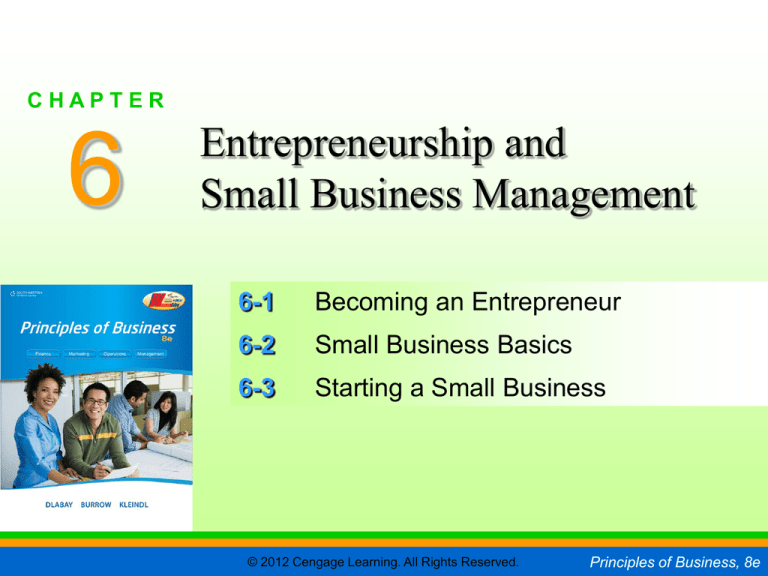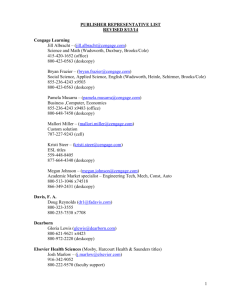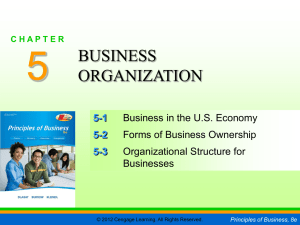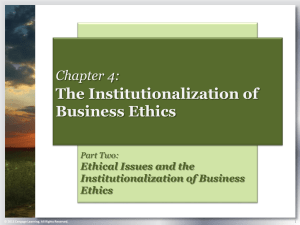
CHAPTER
6
SLIDE 1
CHAPTER
6
Entrepreneurship and
Small Business Management
6-1
Becoming an Entrepreneur
6-2
Small Business Basics
6-3
Starting a Small Business
© 2012 Cengage Learning. All Rights Reserved.
Principles of Business, 8e
6-1
Becoming an
Entrepreneur
Goal 1 Identify characteristics of successful
entrepreneurs.
Goal 2 Recognize the importance of
entrepreneurship in the economy.
Goal 3 Describe opportunities and risks of
entrepreneurship.
© 2012 Cengage Learning. All Rights Reserved.
SLIDE 2
CHAPTER
6
KEY TERMS
● Entrepreneur- the individual that is a risk
taker and innovator.
● Entrepreneurship- the business that is
creative and risky.
● Characteristics: Creative, confident, goaloriented, motivated, hard-working
● Risks: Unproven idea, little management
experience, long-hours with no guarantee
of a profit
© 2012 Cengage Learning. All Rights Reserved.
Principles of Business, 8e
CHAPTER
6
KEY TERMS
● Venture Capital- Money provided by large
investors to finance new products and new
businesses that have a good chance to be
very profitable
*Innovation- a brand new creation or invention
*Improvements- a significant design change or
addition on an existing product
© 2012 Cengage Learning. All Rights Reserved.
Principles of Business, 8e
CHAPTER
Small Business- a business with
6
less than 500 employees (typically
just a few people)
● Not all business owners and managers are entrepreneurs.
● Entrepreneurs have unique skills and personal characteristics.
● 3 CHARACTERISTICS OF A SMALL BUSINESS:
The owner is usually the manager
Usually only 1 or 2 locations
Typically serves a small market
© 2012 Cengage Learning. All Rights Reserved.
Principles of Business, 8e
CHAPTER
6
3 Reasons most small businesses fail
● Lack of money
● Lack of management experience
● Not keeping adequate records
© 2012 Cengage Learning. All Rights Reserved.
Principles of Business, 8e
CHAPTER
Employment Growth by
Business Size, 1990–2005
24.9%
36.3%
6
1-9 employees
20-99 employees
100-499 employees
20.1%
500 or more employees
18.7%
© 2012 Cengage Learning. All Rights Reserved.
Principles of Business, 8e
CHAPTER
6
Checkpoint
● What are the sources of financing that
entrepreneurs use for their new
businesses?
● Personal savings
● Friends and family
● Venture capital
● Bank loans
© 2012 Cengage Learning. All Rights Reserved.
Principles of Business, 8e
CHAPTER
6
SLIDE 9
KEY TERMS
● Small Business Administration (SBA)- a
government agency that helps small
business owners develop business plans
and obtain financing
© 2012 Cengage Learning. All Rights Reserved.
Principles of Business, 8e
CHAPTER
Common Types of Small Businesses
as Percent of All Small Businesses
© 2012 Cengage Learning. All Rights Reserved.
6
SLIDE 10
Principles of Business, 8e
CHAPTER
6
SLIDE 11
BUSINESS PLAN
Business Plan- a written description of the
business idea and how it will be carried out.
5 ELEMENTS
1)Description of the business & goals
2)Customer Analysis- knowing your customer
3)Operations Plan- organizing the business
4)Marketing Plan- marketing & advertising
5)Financial Plan- Creating a Budget:
start up, short term & long term
© 2012 Cengage Learning. All Rights Reserved.
Principles of Business, 8e
CHAPTER
6
SLIDE 12
Checkpoint
● What are the “strategic alternatives” in a
business plan?
● Strategic alternatives are alternative plans for
production, staffing, financing, and so on.
● Even the best business plan cannot predict every
possible circumstance.
● An alternate plan allows a business to be prepared
for the unforeseeable.
© 2012 Cengage Learning. All Rights Reserved.
Principles of Business, 8e
CHAPTER
FINANCING
THE SMALL BUSINESS
6
SLIDE 13
● Types of financing
● Start-up financing- the money and
details of getting the business started:
inventory, supplies
● Short-term financing- the money needed
for the first year of expenses
● Long-term financing- a 3-5 year plan of
success for the business, identify long
term financial needs.
© 2012 Cengage Learning. All Rights Reserved.
Principles of Business, 8e
CHAPTER
6
SLIDE 14
Checkpoint
● In addition to owner-supplied capital,
what are several other sources of
financing for a small business?
● Borrowed money may come from banks,
finance companies, or other individuals,
such as friends and family.
● Some suppliers may also be willing to
extend credit.
© 2012 Cengage Learning. All Rights Reserved.
Principles of Business, 8e
CHAPTER
6
EntrepreneurONLINE RESEARCH
● WHO INSPIRES YOU?
● WHAT IDEAS INSPIRE YOU?
© 2012 Cengage Learning. All Rights Reserved.
Principles of Business, 8e






















